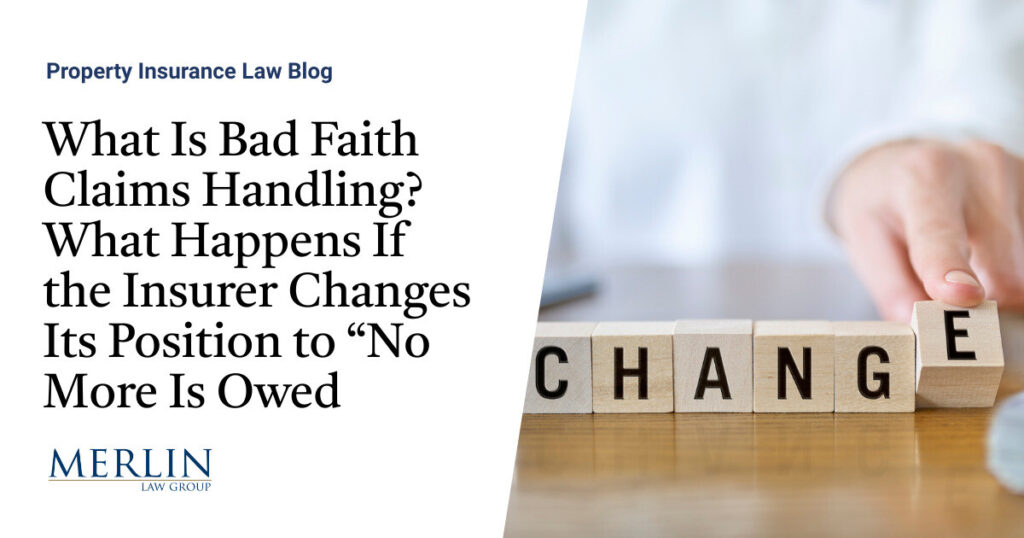What Is Bad Faith Claims Handling? What Happens If the Insurer Changes Its Position to “No More Is Owed?”

The insurer changes its position regarding the amount damaged or owed. Does that mean the insurer acted in bad faith? The answer is obviously ‘no.’ New information that is legitimate may change what is owed to the policyholder.
A recent Colorado case discussed these issues.1 Here are the facts recited by the judge:
After the hailstorm, El Dueno submitted a claim for property damage to Mid-Century pursuant to its insurance policy. In response, Mid-Century assigned a claims adjuster, Maggie Fields, to investigate the roof. Ms. Fields found hail damage to certain roof surfaces, which she estimated amounted to approximately $22,000 of damage. Mid-Century paid this amount, less the policy’s deductible and depreciation, to El Dueno. Mid-Century also paid El Dueno $2,500 based on an estimate to repair rooftop HVAC machinery.
El Dueno’s contractor, CJ Restoration, soon thereafter provided a far greater estimate, $343,000, to replace almost the entire roof. Mid-Century then transferred the claim to a different adjuster, Patrick McCourt, who hired Rimkus Engineering to perform an additional inspection. Rimkus had an engineer, William Templeton, inspect the roof. He reported that “[t]he roof coverings, including the granule-surfaced modified bitumen membrane and the concrete roof tiles, were not damaged by hailstone impacts.” He also found that any damage to the roof was pre-existing or resulted from other causes. His report was peer-reviewed by another licensed engineer, who concurred with its findings. The Rimkus report did not address the previous inspection by Ms. Fields.
After receiving the Rimkus report, Mid-Century notified El Dueno that the roof repairs were not covered under the insurance policy, but that Mid-Century would not seek to recoup the payments it had already made towards the repairs. Unsatisfied with this result, El Dueno filed this suit, claiming that Mid-Century unreasonably denied benefits in violation of Colo. Rev. Stat. §§ 10-3-1115–16.
Assuming the expert is competent, fully informed of the facts, not outcome-oriented, and not biased, most courts will find that an insurer can rely on an expert’s opinion, and the court noted the same:
Multiple courts have held that reliance on an engineering report, prepared by qualified professionals according to established and reliable methods, is reasonable as a matter of law, and cannot be the basis for a bad faith claim. See Musel Master, LLC v. Am. Fam. Mut. Ins., No. 18-cv-2725-RBJ, 2019 WL 9244886 (D. Colo. June 24, 2019); Avalon Condominium Ass’n, Inc. v. Secura Insurance, 2015 WL 5666628 (D. Colo. Sept. 25, 2015); Bell Advisors, LLC v. American Family, 2018 WL 549962 (Colo. App. Jan. 25, 2018). El Dueno’s attempts to distinguish these cases are unavailing. In each of these cases, the insurer, like Mid-Century, retained an engineering firm that ultimately found insurance benefits were not warranted—in Musel Master, also like in this case, the engineering report contradicted an earlier claim adjuster’s opinion. The plaintiffs in those cases similarly alleged statutory faith. But the courts in each case found that reliance on a qualified engineer’s report finding no covered damage was reasonable basis to deny insurance benefits.
…
El Dueno does not cite a single case supporting its position that favoring a more qualified engineer’s opinion as opposed to an inexperienced claim adjuster is unreasonable. Cf. Musel Master, 2019 WL 9244886 (finding reliance on engineering report was reasonable even though insurance adjuster had previously affirmed coverage). Nor is that position logical. The purpose of retaining an engineering firm for a second opinion is to assess the cause of damage more reliably. If it were unreasonable for an insurance company to change its coverage position based on an engineer’s second opinion, it would render the second opinion useless.
This case is currently on appeal after the policyholder lost, but there are lessons for insurers and policyholders. First, decisions for payment or non-payment regarding coverages owed can always be changed based on new information so long as the new information is legitimate and properly vetted.
I am mindful that issues of waiver and estoppel may come into play. I am not delving into those issues which may change the outcome of this post. But those always need to be considered in this scenario.
Second, accusations of bad faith should never be thought of as automatic when an insurer changes position based on legitimate evidence and after a full investigation. People will come to different and legitimate conclusions when new evidence or opinions come to light.
Of course, is the new evidence truly legitimate and fairly considered by the insurer? This is where many bad faith cases are won and lost. It depends on the evidence. The policyholder generally has to prove the bad faith case. Assumptions and projections without evidence will not suffice.
Thought For The Day
It is a capital mistake to theorize before one has data. Insensibly one begins to twist facts to suit theories, instead of theories to suit facts.
—Sherlock Holmes
1 El Dueno v. Mid-Century Ins. Co., No 1:21-cv-01532 (D. Colo. Feb. 23, 2024).







